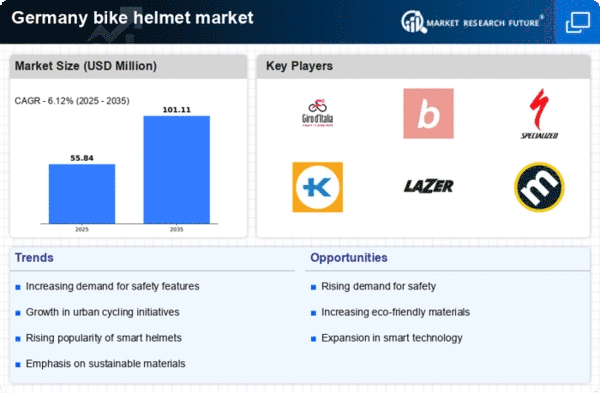Regulatory Safety Standards
The implementation of stringent safety regulations in Germany is influencing the bike helmet market. Authorities have established mandatory safety standards for helmets, which are designed to protect cyclists from head injuries. These regulations have led to an increase in consumer confidence, as individuals are more likely to purchase helmets that meet these safety criteria. Recent statistics indicate that compliance with safety standards has risen to 85% among manufacturers, which is expected to bolster the market. The bike helmet market is thus benefiting from a dual effect: increased sales driven by regulatory compliance and heightened consumer awareness regarding the importance of wearing helmets while cycling.
Rise in Health Consciousness
A growing trend towards health and fitness among the German population is contributing to the expansion of the bike helmet market. As more individuals prioritize physical activity, cycling has emerged as a popular choice for exercise and commuting. This shift in lifestyle is reflected in a reported 20% increase in cycling participation over the last three years. Consequently, the demand for protective gear, including helmets, has surged. The bike helmet market is likely to capitalize on this trend, as health-conscious consumers are more inclined to invest in quality helmets that ensure their safety while promoting an active lifestyle.
Increased E-commerce Penetration
The rise of e-commerce platforms in Germany is reshaping the bike helmet market. Consumers are increasingly turning to online shopping for convenience and a wider selection of products. Recent data suggests that online sales of bike helmets have grown by 30% in the past year alone. This shift not only provides consumers with access to various brands and models but also facilitates price comparisons, leading to more informed purchasing decisions. The bike helmet market is thus poised for growth as e-commerce continues to thrive, allowing manufacturers and retailers to reach a broader audience and enhance their market presence.
Growing Urban Cycling Infrastructure
The expansion of cycling infrastructure in urban areas of Germany appears to be a pivotal driver for the bike helmet market. Cities are increasingly investing in dedicated bike lanes, parking facilities, and safety measures, which encourages more individuals to adopt cycling as a mode of transport. According to recent data, the number of cycling paths in major cities has increased by approximately 15% over the past five years. This enhanced infrastructure not only promotes cycling but also raises awareness about safety, leading to a higher demand for helmets. As more cyclists take to the streets, the bike helmet market is likely to experience significant growth, with an expected increase in sales as safety becomes a priority for both new and experienced cyclists.
Environmental Sustainability Initiatives
The growing emphasis on environmental sustainability in Germany is influencing consumer behavior in the bike helmet market. As more individuals seek eco-friendly transportation options, cycling is increasingly viewed as a sustainable alternative to motor vehicles. This shift is supported by government initiatives aimed at reducing carbon emissions, which have led to a rise in cycling as a preferred mode of transport. Consequently, the demand for helmets that are produced using sustainable materials is on the rise. The bike helmet market is likely to benefit from this trend, as manufacturers adapt to consumer preferences for environmentally responsible products, potentially leading to increased sales and market growth.






















Leave a Comment